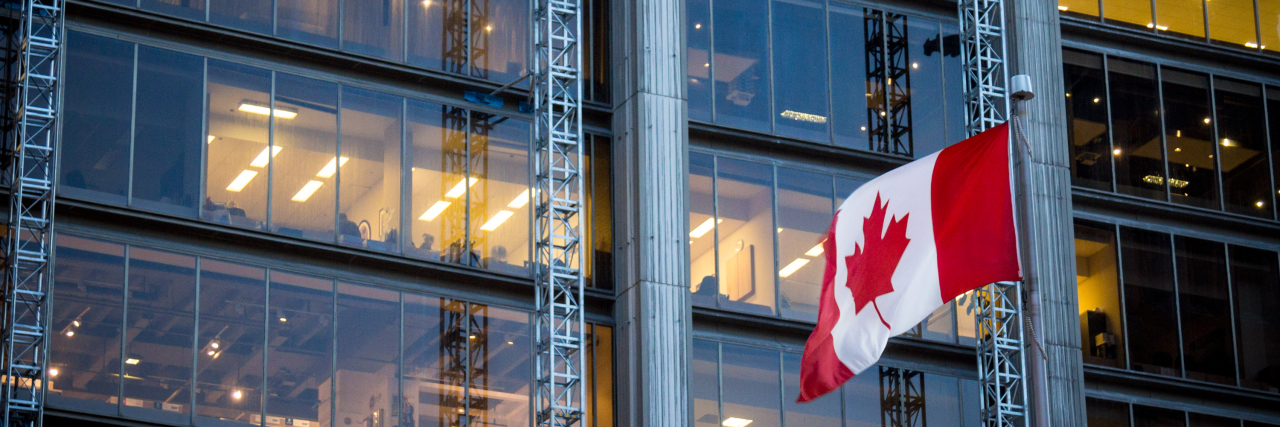Living with a disability can be challenging, and sometimes it can be very difficult to find reasons to be grateful in spite of that disability. With all the stories circulating on social media about the struggles and injustices and restrictions people with disabilities face on a daily basis, it’s easy to become mired in anger and indignation and self-pity. But I’ve been spending some time thinking about my own experiences since becoming disabled 10 years ago, and have come to realize just how fortunate I am.
I live in Canada. We are not the most liberal and progressive country in the world, but we are far from the worst, and I feel lucky to live here. First of all, we have universal health care, and if you are on disability benefits (which is relatively easy to obtain compared to other countries, including our neighbor, USA) you don’t have to pay for it. This meant when I was released from the hospital 18 months after my illness, I did not owe hundreds of thousands of dollars I did not have. It also meant all the therapists, specialists and surgeons I continued to see for years after billed the government instead of me. I have no debt as a result of my illness and injury.
Speaking of disability benefits, my life is fairly comfortable because of it. Under the Ministry of Social Development, there are many programs to help people with disabilities. One such program allows me to stay in a Family Care Home. I have my own small suite inside my caregiver’s home. She or another caregiver are available 24/7, so I have help throughout the day whenever I need it. This allows me to maintain my independence without sacrificing any of my needs. The government funds my caregiver, and she provides me with shelter, food, basic toiletries, cable and internet. Also, the government sends me a monthly “comfort” check, which I use for things like entertainment, medical cannabis, cigarettes etc. Every couple of years I am awarded a clothing allowance, and every Christmas there is a little extra on my comfort check.
Being on disability benefits also affords me the ability to get the equipment I need, such as wheelchairs and beds. Of course, when dealing with the Ministry, there is red tape to get through and long waiting periods, but if you don’t have private insurance, at least you are still able to get the equipment you need. I am fortunate enough to have very good insurance through my husband’s work, so I have never had an issue with funding. Both wheelchairs and their servicing, my bed, raised toilet seat, support poles and bars, AFOs and back brace have all been provided for me virtually free of charge. As well, my prescriptions and most dental costs are covered by the Ministry and insurance.
That is my financial life. Now let’s talk about my emotional and social life. I left the hospital with depression, PTSD, and anxiety. Through the social programs and funding from the government, I had access to medications and therapy free of charge. The sessions were limited, but it was a starting place. In Canada, there is just about every social program you can think of for people with disabilities. Whether it is about reintegrating back into the community, or personal growth, or physical activity, or creative expression, there is a program available, often free of charge. And as for the citizens of my country — they are generally quite kind and helpful. Of course there is ignorance and prejudice and moments and places of inaccessibility, as there is everywhere in the world, but by and large, Canadians are a compassionate, inclusive people, and I am proud to be one of them.
Like I’ve said, I am acutely aware of just how fortunate I am, especially when I read the stories on social media. Many countries are not as progressive, and many people with disabilities suffer without the funding, services and equipment they require to live a full and meaningful life. While this makes me sad, I am also hopeful. Before World War II, people with disabilities in Canada were treated as defective and often institutionalized. Today, we are treated with dignity and provided with the means to live as independently as possible. It means things are changing, sometimes quickly, sometimes painfully slowly, but they are changing.
I can envision a world where disability is considered just another part of life, and everyone takes responsibility for its inclusion and support in daily life. Not only am I grateful for the support I have received and continue to receive from my government and society, but I’m grateful for what it looks like the future holds for people with disabilities everywhere.
This story originally appeared on A Day in the Life of a PWD.
Getty image by BalkansCat.

